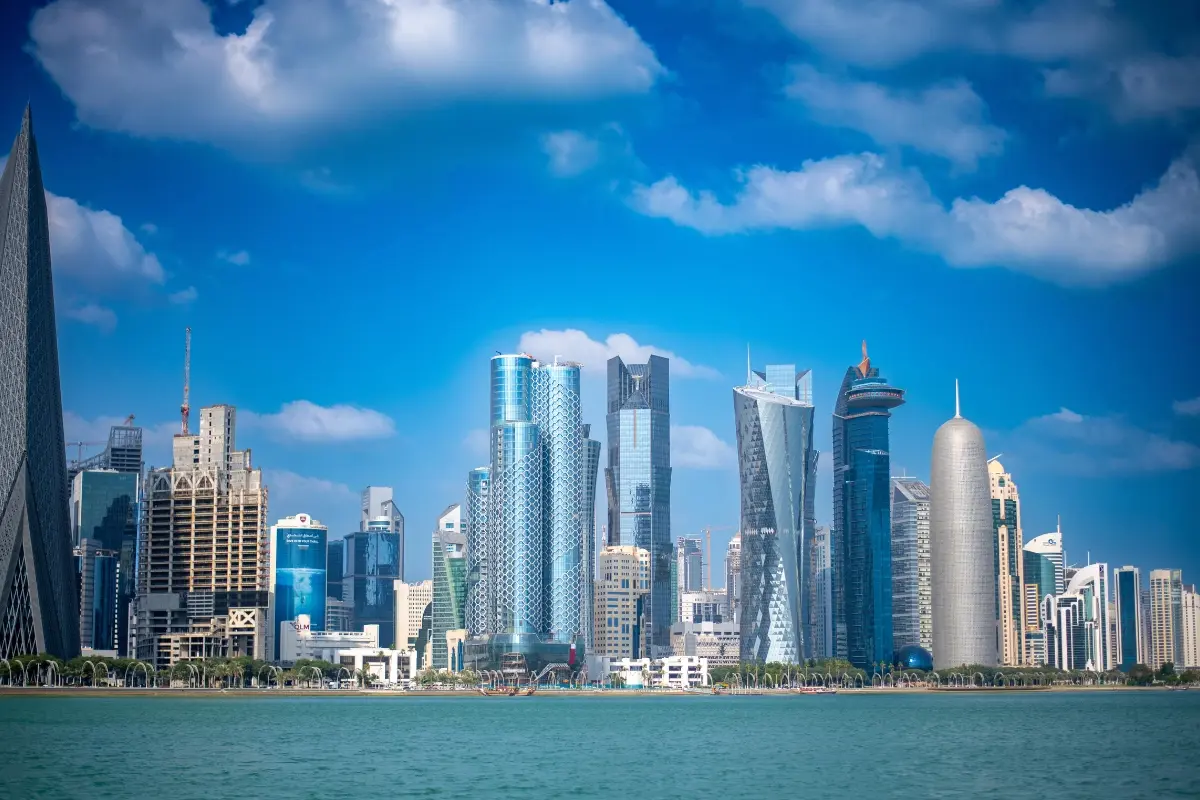Knight Frank
•11 Jul 2025
Investors' Guide: How to Properly Buy Property in Qatar
Investor Intelligence
The real estate market in Qatar offers international investors with unprecedented opportunities. The fast growth of the country, its geographical position, and the recent reforms in the sphere of regulation have turned the country into an attractive place to invest in property. The ability to buy luxury properties for invest in Qatar and gain residency benefits is a combination that is drawing the interest of the world.
The 2022 FIFA World Cup and Qatar's National Vision 2030 have accelerated infrastructure development and urbanization, creating a dynamic property market. New legislation allows foreign investors to not only buy property but also obtain residency permits and pass property to heirs. This comprehensive guide walks you through the essential steps to successfully navigate Qatar's real estate investment landscape.
Understanding Qatar's Market and Legal Framework
The real estate industry in Qatar has changed dramatically since 2020. The government has come up with progressive laws that allow foreign investors to own property, a move that is a breakthrough to the past restrictions.
Legal Rights for Foreign Investors
Foreign investors can purchase property in designated areas including The Pearl, Lusail, and West Bay Lagoon. These zones are specifically developed for luxury living and investment opportunities. The new regulations grant foreign property owners the right to pass on and inherit their investments, providing long-term security for international buyers.
The residency permit system adds substantial value to property investment. Purchasing property worth at least $200,000 (approximately QAR 730,000) qualifies investors for a five-year residency permit. Those investing around $1 million (QAR 3.65 million) may qualify for permanent residency, which includes additional benefits such as free education and healthcare.
Market Dynamics and Growth Drivers
Qatar's real estate market benefits from several key factors. The country's strategic location as a business hub between Asia, Europe, and Africa attracts multinational corporations and high-net-worth individuals. Major infrastructure projects, including the expansion of Hamad International Airport and the development of new cities like Lusail, continue to drive demand.
The market shows particular strength in luxury segments, with waterfront properties and high-end developments commanding premium prices. Tourism infrastructure development and the hosting of international events create additional demand for both residential and commercial properties.
Define Your Investment Goals
Successful property investment begins with clear objectives. Qatar's diverse real estate market can accommodate various investment strategies, from rental income generation to capital appreciation and personal use.
Investment Strategy Options
Rental income represents a primary motivation for many investors. Qatar's expatriate population, which comprises over 80% of residents, creates consistent demand for quality rental properties. Luxury properties for investment in Qatar often yield attractive rental returns, particularly in prime locations near business districts and international schools.
Capital appreciation potential remains strong given Qatar's development trajectory. The country's economic diversification efforts, outlined in National Vision 2030, support long-term property value growth. Areas undergoing infrastructure development typically show the strongest appreciation potential.
Residency-driven investment appeals to investors seeking a foothold in the Gulf region. The combination of property ownership and residency rights provides access to Qatar's business opportunities and regional connectivity.
Property Type Considerations
Residential properties include apartments, villas, and townhouses across various price ranges. Luxury apartments in The Pearl and West Bay offer modern amenities and sea views, while villas in compounds provide family-friendly environments with community facilities.
Commercial properties present opportunities for investors seeking higher yields. Office spaces, retail outlets, and hospitality properties can generate substantial returns, though they typically require larger initial investments and more complex management.
Off-plan properties offer potential cost advantages but require careful evaluation of developer credentials and project timelines. These investments can provide significant returns if the development proceeds successfully.
Conduct Thorough Due Diligence
Due diligence protects your investment and ensures legal compliance. Qatar's regulatory environment requires specific documentation and verification processes that foreign investors must navigate carefully.
Property Verification Process
Start by inspecting the property thoroughly, either in person or through qualified representatives. Examine the building's condition, common areas, and surrounding infrastructure. For new developments, review construction progress and completion timelines.
Title deed verification through the Qatar Real Estate Registration Department confirms legal ownership and identifies any encumbrances. This step reveals crucial information about property rights, restrictions, and obligations.
Permit and approval verification ensures the property meets all regulatory requirements. Check building permits, occupancy certificates, and compliance with municipal regulations. Properties without proper documentation can create significant legal and financial risks.
Professional Support
Engage reputable real estate agents familiar with foreign investment requirements. Experienced agents provide market insights, identify suitable properties, and facilitate negotiations. They also maintain relationships with banks and legal professionals who can expedite the purchase process.
Legal advisors specializing in Qatar real estate law provide essential guidance on contracts, ownership rights, and regulatory compliance. Their expertise helps avoid common pitfalls and ensures proper documentation.
Property inspectors and valuers offer independent assessments of property condition and market value. Professional valuations support financing applications and investment decision-making.
Secure Financing and Navigate Legal Requirements
Financing options in Qatar accommodate various investor profiles and property types. Understanding available financing mechanisms and legal requirements streamlines the purchase process.
Mortgage and Financing Options
Most Qatari banks offer mortgages to residents with stable income and employment history of at least six months. Down payments typically range around 30% of the property value, with loan terms extending up to 25 years.
Interest rates and terms vary among banks, making comparison shopping essential. Some real estate agencies maintain relationships with preferred lenders who may offer competitive rates or streamlined approval processes.
Alternative financing options include developer financing for off-plan properties and private lending arrangements. These alternatives may offer more flexible terms but require careful evaluation of risks and costs.
Legal Documentation
Property purchase contracts must comply with Qatar's legal requirements and include specific clauses protecting buyer interests. Contracts should clearly define property boundaries, including fixtures, completion timelines, and penalty clauses for delays.
Residency permit applications require specific documentation including property ownership proof, financial statements, and personal identification. The process typically takes several weeks and may require multiple government office visits.
Banking relationships facilitate ongoing property management and financial transactions. Establishing accounts with local banks simplifies rent collection, maintenance payments, and other property-related expenses.
Engage with Local Real Estate Professionals

Professional relationships are crucial for successful property investment in Qatar. Local expertise navigates cultural nuances, regulatory requirements, and market dynamics that foreign investors might otherwise overlook.
Selecting Real Estate Agents
Choose agents with proven track records in luxury properties for invest in Qatar and experience with foreign clients. Qualified agents hold valid licenses from Qatar's regulatory authorities and maintain professional indemnity insurance.
Evaluate agents based on their knowledge of target areas, client testimonials, and market presence. Agents specializing in investment properties understand rental markets, yield calculations, and long-term value drivers.
Communication skills and cultural sensitivity matter significantly when working across language and cultural barriers. Effective agents facilitate smooth interactions with sellers, banks, and government officials.
Legal and Financial Advisors
Legal professionals must understand both local property law and international investment structures. They should provide clear guidance on ownership rights, inheritance laws, and tax implications for foreign investors.
Financial advisors help optimize investment structures, manage currency risks, and plan for ongoing property expenses. Their expertise becomes particularly valuable for investors holding properties across multiple countries.
Property management companies handle day-to-day operations for investors who don't reside in Qatar. Services include tenant screening, rent collection, maintenance coordination, and regulatory compliance.
Finalize the Purchase and Registration
The property purchase process involves several sequential steps that require careful coordination and timing. Understanding each phase helps ensure smooth completion and proper legal registration.
Purchase Process Steps
A deposit of 10-20 percent of the purchase price is usually required to reserve the property. This is a down payment that locks the property as the final financing and legalities are being made. The reservation contracts must provide the completion schedules and the terms of deposit refund.
Final inspections occur before contract signing to confirm the property meets agreed specifications. For new developments, this inspection verifies completion of all work and proper functioning of systems and appliances.
Contract signing involves multiple parties including buyers, sellers, agents, and legal representatives. All parties must review terms carefully and ensure proper documentation before execution.
Registration and Transfer
Transfer of ownership must be registered with the Qatar Real Estate Registration Department. This is done by providing original documents, correct translations and paying the necessary fees. After this is done, the title deed is issued, which is a legal document that proves ownership and allows future transactions of the property. This step is important to ensure that all ownership information is correct and well documented.
The last procedures involve transferring utilities and making municipal registrations to complete the ownership transfer. These will help in ensuring that there is proper billing and that the local regulations are adhered to and that there is a smooth transfer of duties to the new owner of the property.
Cost Considerations
The cost of transactions in buying property is usually between 2-6 percent of the property value. The average legal fees are approximately 1 percent of the purchase price, whereas the real estate agent fees may range between 1 and 5 percent. There are no taxes on property transfer in Qatar, although buyers need to consider other costs, including registration fees, translation of documents, and professional services. The cost can also be increased by banking charges such as mortgage processing and currency conversion.
Besides the initial expenses, there are recurring expenses such as property management fees, maintenance costs, and utilities. Such recurrent expenses must be well considered in the calculation of yields and long-term financial projections to give the right projections and profitability to investors.
Building Your Qatar Property Portfolio

The real estate market in Qatar offers excellent investment opportunities to investors due to its strategic location, economic diversification, and foreign-friendly policies. These make property investment a perfect environment especially to those who take time to learn the dynamics of the local market and ensure that they are in line with the regulatory requirements. The key to success in this market is to do due diligence and work with local professionals who have experience in the market to guarantee high returns and appreciation of the property in the long run.
The luxury property sector is particularly promising, with Qatar having a high-income expatriate population and ongoing infrastructure development. Investors can take advantage of this growth by establishing clear objectives, conducting research on target areas, and collaborating with local experts who are qualified. Also, the opportunity to invest in property and live in it is a significant advantage that makes Qatar an even more attractive place to invest in real estate, as it provides the possibility to create valuable portfolios in one of the most vibrant markets in the region.
Contact us to explore your investment opportunities today.